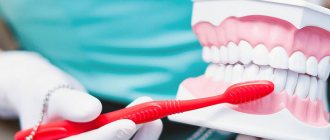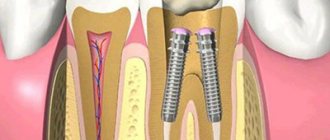With a wide variety of offers from dental clinics about a full range of services, it is worth knowing which doctor can perform tooth extraction and visiting only such specialists.
Every person at any age needs dental treatment, and sooner or later it becomes necessary to have a tooth removed. Our price in Dolgoprudny for this type of service is optimal, taking into account the availability of many drugs for pain relief and the work of real professionals. Often, in search of a specialist who can perform this manipulation, patients end up with inexperienced doctors. This can lead to complications. And only then, having understood the issue, it turns out that not every dentist actually has the right to carry out such manipulations. Therefore, if it is necessary to remove a tooth, price should not be a fundamental factor in choosing a doctor; it is important to know who exactly you need to contact.
Which dentist should I contact for tooth extraction?
The professional specialization of dentists includes quite a few areas. Moreover, all specialists are called dentists, but not everyone can perform surgical intervention. If the tooth cannot be treated, the following doctors can truly solve the problem efficiently:
- dentist-surgeon;
- maxillofacial surgeon.
They just don’t know how to properly prepare the treatment area for surgery, how to select anesthesia, remove all elements of the tooth as accurately as possible, and apply sutures, if necessary. These specialists are also competent to perform operations on the jaw bone and aesthetic surgery in cases of prosthetics.
Opinion of a dentist at Dynasty Dentistry Tooth extraction cannot be performed by dentists of such specialization as a general practitioner, orthodontist, periodontist, or orthopedist. Only a licensed doctor has the right to practice surgery. Our clinic employs a group of specialists whose activities are carried out absolutely legally. They constantly undergo certification to confirm their level of qualifications.
Who is a dentist?
Dentist is a unifying definition applied to a dental specialist with higher education. (Stoma, stomatos means mouth in Greek, logos – teaching). To become a dentist, you need to graduate from a medical academy, institute or university.
The duration of their studies is at least 5 years. Along with dental diseases, future dentists study many medical sciences - biochemistry, physiology, therapy, histology, etc.
They are prepared not only theoretically, but also practically, having completed a one-year internship or a 2-year residency.
A reliable doctor always works with quality guarantees
If it is necessary to remove a tooth, the cost and expectation of pain, as well as the fear of complications, often cause the patient to be afraid to go to the clinic.
In our dentistry, everything is created in order to create psychological comfort for the patient. Very high-quality anesthesia, real professionals with many years of experience and modern equipment allow painless removal of any complexity. The financial benefit of visiting our clinic is that the doctor guarantees the absence of complications, and therefore you will not have to visit the dentist again and again. Our specialists can solve dental problems of any complexity without the slightest difficulty.
Categories of dentists
Dentists are required to confirm their qualifications every 5 years
Each dentist has a certain qualification category, which is an indicator of the level of his theoretical knowledge and practical skills.
The procedure for assigning a qualification category is determined by order of the Ministry of Health of the Russian Federation.
Dentists are required to confirm their qualifications every 5 years.
Those who wish to improve their qualifications themselves must wait 3 years from the date of the last certification.
Regulatory documents provide for three types of categories in ascending order:
- second (is basic);
- first;
- highest.
Requirements for various categories:
| Category | Requirements |
| Second | Work experience in the specialty for at least 3 years. Successful completion of certification. |
| First | Work experience in the specialty for at least 7 years. For a specialist with secondary education – at least 5 years. Successful completion of certification. |
| Higher | Work experience in the specialty for at least 10 years. For a specialist with secondary education – at least 7 years. Successful completion of certification. |
What should you be concerned about?
Be careful if your chosen dentist:
- Offers the most expensive treatment without communicating alternative options. A good specialist, on the contrary, talks in detail about the different treatment options, costs, advantages, and disadvantages of each, leaving the choice to the patient.
- Does not draw up a detailed plan, increases the initially stated price, and prescribes additional conditions in the contract that are unfavorable to the patient.
- Includes procedures that were not provided on the check.
- Forces expensive services, such as implantation, in situations where a filling or crown is sufficient.
- Treats non-existent diseases, scares with complications.
If you doubt the treatment proposed by your doctor, visit 1-2 more specialists. Show them the test results. This will give you several independent opinions and allow you to compare different treatment plans. Choose a doctor whose opinion coincides with the majority. By the way, you have nothing to lose, since the initial consultation in many clinics is free.
How much does dental therapy cost in Moscow?
The cost of therapy at the Cavitron Dentistry Center depends on several factors:
- a set of studies necessary to make a diagnosis;
- quantity and type of materials used during treatment;
- the need for further prosthetics.
Our dentist-therapist in Moscow first agrees with the patient on treatment tactics and the final cost. He will offer alternatives so that you choose the best treatment option in terms of quality and price.
BOOK RIGHT NOW FOR A CONSULTATION WITH OUR SPECIALIST BY PHONE +74953692944 AND RECEIVE A GREAT OFFER!
History of the profession
The very first mentions of dental therapy are found in the history of Ancient Egypt. Tools similar to modern analogues have been found more than once in tombs. Many more Egyptian skulls with crowns on their teeth were also discovered there, and these were not only rich people. Judging therefore, it can be said that some types of dentistry were developed in Egypt. In addition, the first toothpaste was mentioned at the same time . It included:
- ashes of the burnt entrails of a bull;
- ground eggshell;
- myrrh;
- crushed pumice.
Then in the IV-V centuries. BC, the great Hippocrates became interested in this science. He recommended eliminating pain with a hot iron. At that time, many people suffered from toothache and did not understand how to deal with it. Fatalities from common flux were common, and during the time of Hippocrates, dentistry advanced several steps forward.
In your free time from work, you can earn extra money
on freelance exchanges (by writing comments, reviews, or simple actions on social networks) - choose what you like best and start earning money!
The first toothbrushes appeared in the Middle East in 500 AD. And in the 4th century AD. e. found forceps used to pull out bad teeth. And also powerful drugs that relieve pain appeared: arsenic and opium. Therefore, people began to understand that there is no need to rush to remove teeth, but that they can be treated. So, in 659 the first fillings appeared.
This specialization developed, and already in Russia, during the reign of Peter I, the profession of dentist officially arose, and rapidly became popular among men and women. In 1881, the first educational institution appeared in St. Petersburg, which trained future dentists. Then such institutions began to open throughout Russia.
February 9 is considered to be International Dentist Day, which falls on the day of St. Apollonia. After all, it was she who accepted martyrdom for Christ. She was tortured with forceps, which caused hellish pain.
How is the diagnosis made?
If the development of dental diseases is suspected, various methods of diagnosing pathologies are used.
If we are talking about pulpitis or caries, the tooth’s reaction to cold and hot is monitored. An accurate examination will allow you to identify caries (damage to dental tissues by bacteria, subsequent destruction of the element), periodontitis (inflammatory process in the ligament or canal) and pulpitis (cavity inside the tooth).
To reliably indicate the sensitivity threshold of a tooth, electroodontodiagnostics (exposure to electric current) is used.
In the process of identifying pathology of the oral cavity, chemical tests cannot be done without. The material from the source of the disease acts as a sample; it is sown on nutrient media. If a chemical reaction is detected, the dentist begins treatment.
Principles of training
If you decide to become a dentist, then you need to understand that this profession is very responsible. Therefore, it is necessary to obtain a medical education.
Those who are interested in dentistry are wondering: how long to study to become a dentist and what is needed for this. To enter a university, you must:
- complete 11 grades in a secondary school;
- pass the appropriate exams in biology, chemistry and Russian.
It is necessary to understand whether a person is ready for this profession. To obtain a specialty in this field, you need good study and a specific goal, as well as the ability to find an approach to even the most picky and harmful patients.
Resume sample
To find a job faster, you need a resume that can be sent to several companies at once. You need to know how to compose it correctly.
The resume must include:
- Full Name;
- Date of Birth;
- contact details: phone, email;
- citizenship;
- experience;
- basic and additional education;
- professional skills;
- knowledge of languages;
- personal qualities.
The resume should be simple and understandable; there is no need to write or invent a lot, because then in practice all the qualities and abilities of the specialist will be assessed.
How a dental therapist works: patient reviews
At the Cavitron Dentistry Center you are in the hands of qualified doctors of the highest category. Feedback from patients confirms that we take a comprehensive approach to diagnosis, which allows us to accurately determine the cause of the disease and prescribe effective treatment. We have a full range of modern dental equipment and instruments, so patients are satisfied with the results of the therapy.
A favorable, friendly atmosphere is also of great importance. We do everything to make our patients feel calm and comfortable, so treatment brings only positive emotions. According to reviews, the therapy takes place without pain, in absolute sterility. We respect those who turned to us for help and sincerely care about their health!
Where to go for help
Government institutions provide dental care free of charge if you have a compulsory health insurance policy (CHI). Depending on the tasks to be solved, they are divided into three levels.
- The first level includes dental offices in enterprises and educational institutions, dental departments in multidisciplinary clinics and district hospitals. They are engaged in the prevention and treatment of the most common types of dental pathologies, including sanitation of the oral cavity and simple prosthetics.
- The second level is dental clinics in administrative districts of cities. They have the necessary equipment and medical personnel for treatment in the main dental specializations: therapeutic and surgical dentistry, dental prosthetics.
- The third level is dental clinics of the constituent entities of the Federation, scientific and educational medical institutes, and specialized centers. They provide diagnostic and therapeutic assistance in narrow areas of dentistry [5].
The right to free services in budget clinics is given by compulsory medical insurance. What services you can qualify for if you have a policy and where to get them, you can find out on the websites of territorial compulsory medical insurance organizations that operate in each subject of the Russian Federation [6].
In addition to the state ones, there are many private paid medical centers that cover the entire range of dental services (by the way, some of them also accept compulsory medical insurance policies). You can find the ones closest to you and read reviews about their work on aggregator sites on the Internet.
Many people make their choice of a dental clinic based solely on the cost of services, which is incorrect. You need to focus on the following factors:
- Image, history, reviews about the medical institution where you want to go.
- It is imperative to request a license and all statutory regulatory documents that any organization must have. Moreover, they must be posted for public viewing.
- You need to pay attention to how document flow is carried out. Do they give you cash receipts after you have paid for treatment? Is there a written agreement on the provision of services for a fee?
Shukhorova Yu. A., Ph.D., chief specialist of the Ministry of Health of the Samara Region in dentistry [6]
The ideal option is to choose a good attending physician (whether a specialist from a public or private clinic) once and for a long time. When a dentist observes a patient for a long time, it is much easier for him to correctly identify the problem and find the optimal solution.
Orthopedics as a field of medicine
Orthopedics treats diseases of the musculoskeletal system as a whole. Orthopedists restore spinal curvatures and treat flat feet. An orthopedic dentist eliminates disorders and restores the chewing-speech apparatus. With the help of prosthetics, the doctor restores the integrity of the jaw, which allows a person to chew food normally and communicate with others.
Symptoms
You should consult an orthopedic dentist if:
- absence (loss or removal) of one or more teeth;
- partial or complete destruction of the dental walls;
- mobility or increased sensitivity of teeth;
- diseases of the gums or bones, for example, periodontal disease, periodontitis;
- cosmetic defects in appearance: different size, irregular shape, enamel pigmentation, any other violations in terms of aesthetics;
- detection of temporomandibular joint disease (TMJ);
- recommendations from a therapist or other specialized specialist who issued such a referral after an examination.
Who is an orthopedic dentist and what does he treat?
This specialist specializes in restoring teeth. He is often confused with an orthodontist, however, there is a big difference between these doctors. An orthodontist straightens crooked teeth and corrects problematic bites using braces and removable plates. An orthopedist partially or completely restores teeth using dentures. He is often called a prosthetist.
An orthopedic dentist or prosthetist eliminates many problems, which makes the patients’ lives comfortable and of high quality:
Improves quality of life and restores psychological comfort.
Due to the absence of one or more teeth, the patient loses self-confidence and feels constant discomfort when communicating with others.
Please note : Psychological complexes and stress can also cause pronounced defects in the dentition, for example, large gaps or chips. The person stops smiling widely, speaking openly and constantly controlling the position of his lips. Such tension can provoke the development of side diseases of the nervous system.
Restores chewing function
Chewing food thoroughly is the key to a healthy digestive system. Chewing dysfunction disrupts the functioning of the entire dental system, reduces muscle tone and slows down blood circulation in soft and bone tissues. The faster the doctor fixes the problem, the faster the patient’s general condition will improve. If the situation is neglected, an inflammatory process may develop, which will lead to periodontitis or periodontal disease.
Saves teeth
Let's imagine a situation: a patient came with dental tissue almost destroyed to the ground, which makes it impossible to install a filling, but the roots remained healthy. Common causes are advanced caries or injury. You can try to stop the destruction process by preserving the roots and nerve endings. An orthopedic dentist also deals with such cases.
Treats edentia
Patients who are missing all their teeth also turn to an orthopedist. He makes removable or fixed dentures and places implants that replace natural teeth. This is not just an opportunity to chew, but a complete return of communication skills and a comfortable stay among others.
The medical practice of the orthopedic office includes:
- restoration of tooth enamel and bone tissue while preserving its own root and nerve canals;
- installing a protective crown on a decaying tooth to stop further shedding and delamination of tissue;
- production and installation of prostheses;
- elimination of aesthetic defects in the dentition, such as cracks, chips, irregularities, pigmentation.
Medical protocols are clearly defined, so orthopedic dentists in qualified clinics always follow established rules and treatment regimens. This allows you to avoid negative consequences and dangerous side effects.
What does an orthopedic dentist do?
The area of competence of the prosthetist includes:
Installation of fixed dentures
Such structures include crowns, inlays, and veneers. These designs are securely fixed and are worn constantly.
Metal-ceramic crowns
The most common type of fixed prosthesis. At the base is a cap made of an alloy of cobalt, chromium and titanium, which is coated with a ceramic composition. This design imitates healthy teeth, lasts from 5 to 10 years and is quite affordable. Safety depends on the presence of impurities in the material, which can cause oxidation and inflammation of the gums.
Zirconium dioxide crowns
One of the most advanced techniques. The cap, shaped like a tooth, is made of zirconium dioxide, which is covered with ceramic on top.
This material does not cause allergic or oxidative reactions. It does not interact in any way with the soft tissues of the gums. When making prosthetics, computer modeling is used, which creates a crown of the most accurate shape and size. The number of possible shades is much greater compared to conventional metal ceramics, so the artificial tooth will not stand out among the natural dentition.
Solid ceramic crowns
There is no metal in such designs, which allows you to fully convey all the shades of the tooth. These crowns are placed on the front teeth.
Installation of removable dentures
Clasp prosthetics are suitable for cases where it is impossible to install fixed structures, and the patient does not have money for implantation. It is an arch with two supports that hold artificial teeth. The orthopedist fixes it to the upper jaw.
The undoubted advantages of clasp dentures are low prices and the absence of surgical intervention. There are quite a lot of disadvantages. Firstly, it takes a long time to get used to the prosthesis. Secondly, it must be removed and cleaned daily. Thirdly, the jaw does not receive full load when chewing food, the blood supply deteriorates and the bone gradually sags. Therefore, removable dentures need to be changed quite often.
Implantation
This is the method that doctors recommend to all patients who have lost one or more teeth. Implants not only maintain a beautiful appearance, but also contribute to the health of the patient.
Regardless of the chosen method of prosthetics, all installed structures must be:
- made taking into account the individual characteristics of the patient;
- designed for long term use;
- safe for health and solve aesthetic problems.
An integrated approach to treatment
Let us once again emphasize the important connection between the orthopedist and other specialized doctors. First, the therapist sanitizes the oral cavity, removes plaque and stones, and treats inflammatory processes in the gums and oral mucosa.
Surgeons remove the roots of teeth that are no longer subject to therapeutic treatment and implant an implant into the patient’s jaw for further manipulation by an orthopedist.
The orthopedic dentist works closely with dental technicians who are responsible for making dentures in the laboratory.
Patient reviews will help you choose a competent orthopedic dentist. It is important to establish complete trust and mutual understanding between the doctor and the patient. Your health and beautiful smile largely depend on this.
Useful recommendations for patients
- Do not wait until your tooth hurts, because in an emergency you will have to contact any available specialist. Choose a dentist while your teeth are fine. This can be done during preventive visits 2 times a year.
- During your first visit, try to establish contact with the doctor, ask questions, listen carefully, and show respect. Try to understand how comfortable you are with this person, whether you can find a common language.
- Do not be content with verbal agreements with the dentist, carefully read the contract with the clinic, try to see the pitfalls, especially in the section with treatment prices.
Advantages and disadvantages
As in any profession, it is not the subject that matters, how much dentists earn, but the positive and negative nuances.
The positive aspects of working as a dentist include:
- qualifications are in demand in all countries of the world;
- high profit payment;
- normal working hours;
- Private practice is possible when you have a lot of experience.
There are also negative indicators that should not be forgotten. The negative aspects include:
- greater responsibility for the patient;
- high cost of training;
- possible stressful situations at work;
- competition;
- expensive equipment and tools;
- the need to constantly improve skills;
- working with different people.
Dentistry is a kind of art that has always been considered a prestigious profession. Therefore, every year students enter universities for this specialty in order to learn and then work and receive high wages.











